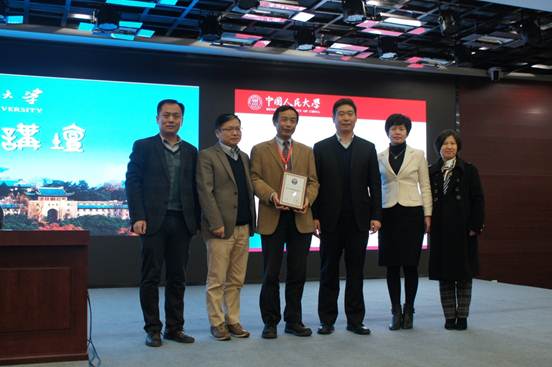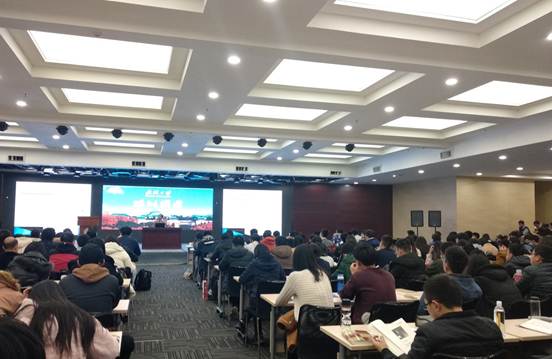The 213th Luojia Lecture was delivered by Professor Ai Chunrong in the large lecture hall of the main library on the night of Dec. 9 2017. Professor Ai is the dean of The Institute of Statistics and Big Data at Renmin University of China. The lecture was organized jointly by WHU School of Information Management (SIM) and WHU School of Humanities and Social Sciences and was presided by the deputy dean of SIM, Professor Lu Wei.

Prof. Ai (third from left) was honored the Luojia Lecturer
Professor Ai began his lecture by presenting his view on what constitutes big data. He emphasized the use of data in decision-making, not the size nor the collection speed nor the structure of the data. Thus, in his view, any data previously never analyzed should all be viewed as big data. With this definition, the national big data campaign can be more effective in promoting the role of big data in decision-making.
Professor Ai then discussed what big data can do for us, using economic and business examples. He argued that the information asymmetry which inherently exists in our economy hinders the flow of goods and services and the efficient allocation of resources. The big data collected from the observed actions of economic agents contains the information about the information asymmetry. Therefore, the value of big data lies in the discovery and mitigation of the information asymmetry, thereby speeding up the flow of goods and services as well as allocation efficiency. For instance, big data can be used for prediction by matching the future with the past. It has wide applications in recommending systems, marketing and advertising, credit card risk management, product design as well as manufacturing management. It is also equally applicable to the government sector, allowing for mass participation in in public governance and lowering the delivery cost of public services through crowd sourcing and smart city initiatives.
Despite the great value of big data, its applications have encountered with great challenges. First of all, who owns the data? Who has the right to manage and analyze the data? How do we protect privacy? These legal issues pose great danger to society and must be tackled legally. Unfortunately, the legal legislation is way behind. Secondly, the analysis of data is as good as the quality of data. The famous saying “garbage in, garbage out” is a testament to the importance of data quality. Minor errors in data can lead to misleading results and erroneous decisions. Thirdly, applications of big data, even in ideal scenarios, are subject to type I and type II error, thereby raising the question of privacy, freedom and equality. For example, people could be profiled by their background such as race, age, income, political and religious orientation. Decisions made on profiling may lead to discrimination, exclusion or even instability. Lastly, Professor Ai noted the shortage of data scientists is the reason why applications of big data is still in the first phase.

Prof. Ai at the lecture
Professor Ai concluded the lecture by outlining the four integral parts of big data application: data, computing platform, analysis and application. Data is the essential ingredient. Platform is the supporting tool. Analysis is the key. Application is the goal. Since government is the biggest data collector, it is her responsibility to build “open data”. The supporting platform requires participation of computer scientists, while data analysis calls for the expertise of statisticians. In the end, extraction of value from big data and applying it towards better decision-making is the only justification for why big data is the national strategy. He also conducted a Q&A session, which is highlighted by a question on whether big data could solve the central planning problem given the rapid information flow. He replied unequivocally “No!”. He argued that big data (and artificial intelligence) applications only extract partially and not all information. There is no way big data analysis can fully learn about individual preferences. Moreover, information flow always takes place after information arrival. Thus, individuals still make better decisions even in the big data era. Besides, solving a central planner problem requires massive optimization and computing which far exceed current technology. Thus, even with assistance from big data, a central planner cannot replace the market system. His thoughtful and coherent arguments left students and faculties deeply impressed.

Prof. Ai Chunrong
Professor Ai Chunrong, dean of the School of Statistics and Big Data of RUC, was born in 1962, and graduated from Huazhong University of Science and Technology (HUST) in 1982. He studied under Nobel Laureate Professor Daniel McFadden in MIT and obtained his PhD in economics in 1990. Professor Ai was awarded Changjiang Chair Professor in 2005 and “Qian Ren Ji Hua” expert in 2009. Professor Ai’s research interest is in the interdisciplinary field between mathematical statistics and economics and finance. He has published more than 40 papers in top economics journals including Econometrica. He has also published dozens of papers in the top Chinese journals including Economic Research, the Journal of Management World, etc.
Edited by Sun Jingyi, Edmund Wai Man Lai & Hu Sijia
Photo by: School of Humanities and Social Sciences


